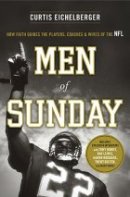This is a movie that I longed to watch while reading this book, and I think the reason I wanted to was because I think that Mike Glenn stole this metaphor and placed it within the biblical framework. I was somewhat let down when it came to the overall nature of the book. To start with the book cover art looks like something out of my loving mothers scripturally inspirational, nautically themed, bathroom. Second, while Glenn had good content his writing voice was not something that inspired or enthralled me in my reading.
The reason why this book was not incredible was because the central theme of the book revolved around a metaphor that was not strong to begin with. Part of the reason the metaphor was not strong was because it was confusing. Some quotes that allude to the sometimes confusing nature are as follows,
“Upon first hearing this idea, you might think that finding and living in your ‘yes’ would be limiting even constricting.” (p.6)
“Once you find the ‘yes’ of God you discover it is the very thing you would have wanted if only you had been smart enough to ask.” (p.7)
This metaphor while in theory is suppose to rally the reader around the understanding perspective structure’s behavior the metaphor seemed to cliche and confusing to grip the reader into this new fastidious approach to the christian life. I do appreciate literature that attempts to cause the reader to analyze their thoughts and perspective of God and understand that that effects how they live down to the tiniest relationships. I give the book a 2 out of 5.
This book was given to me in order to review this content of Blogging for Books.


 So I have picked up Peter Rollins The Orthodox Heretic and have decided to blog through it. I have heard a vast array of people state their concerns with him and his thinking, but what kind of student would I be if accepted someone else’s perspective and not create my own. Let’s start at the beginning, his introduction does little to help the reader to understand the title, but he develops his case for parables. He believes that in order to understand things that cannot be spoken of(the Divine) we need a different framework for transformation.
So I have picked up Peter Rollins The Orthodox Heretic and have decided to blog through it. I have heard a vast array of people state their concerns with him and his thinking, but what kind of student would I be if accepted someone else’s perspective and not create my own. Let’s start at the beginning, his introduction does little to help the reader to understand the title, but he develops his case for parables. He believes that in order to understand things that cannot be spoken of(the Divine) we need a different framework for transformation.